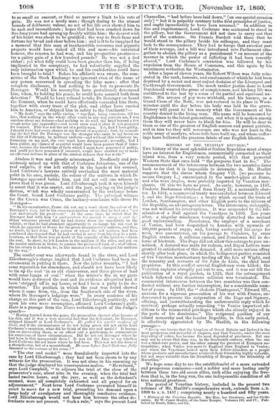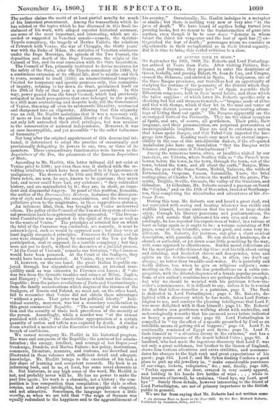HISTORY OF THE V.ENETIAN REPUBLIC. * Tun history of the most
splendid of Italian Republics must always have an interest for Englishmen, commercially connected as their island was, from a very remote period, with that powerful Western State that once held "the gorgeous East in fee." The commencement of the intercourse between the two countries dates back so far that it is impossible to determine it. Mr. Hazlitt suggests that the slaves whom Gregory VII. (we presume he means Gregory L,) emancipated in the market-place at Rome, and who were Angles, were probably imported by Venetian mer- chants. Of this we have no proof. As early, however, as 1157, Frederic Barbarossa obtained from Henry II. a mercantile char- ter. In 1304, a commercial treaty was concluded between Edward I. and the Doge Gradenigo ; a treaty which opened the trade of London, Southampton, and other English ports to the citizens of the Republic, on advantageous terms. The intercourse' unhappily, was not without its interruptions. It was suspended by the ful- mination of a Bull against the Venetians in 1309. Ten years after, a singular mischance temporarily disturbed the mutual good understanding. Basadonna, the employe of a merchant of Venice, had been despatched to London with upwards of 100,000 pounds of sugar, and, having exchanged his cargo for wool, was encountered, on his passage to Flanders, by some English cruisers. A collision ensued, and Basadonna fell in de- fence of his trust. The Doge did not allow this outrage to pass un- noticed. A demand was made for redress, and Royal Letters were granted in satisfaction of this demand. A still more serious affray shortly after took place, in which the belligerent parties consisted of five Venetian merchantmen trading off the Isle of Wight, and the tenantry and servants of Sir John de Lisle, the chief local proprietor. In this conflict several Englishmen were killed ; the Venetian captains abruptly put out to sea, and it was not till the publication of a royal pardon, in 1323, that the estrangement which followed this disastrous collision was terminated. The commercial intercourse between the two countries was then con- ducted without any further interruption, for a considerable num- ber of years. In 1340, the "choleric Plantagenet," Edward
anxious for a vigorous prosecution of his war with France, en- deavoured to procure the cooperation of the Doge and Signory, offering, and (notwithstanding the unfavourable reply which he received) perhaps actually conceding "to Venice important ad- ditions to the commercial privileges which she already enjoyed in the ports of his dominions." The reciprocal position of our island monarchy and the insular Republic, in this early period, is effectively appreciated by Mr. Hazlitt, in the following
passage- " Every one knows that the kingdom of Great Britain mid Ireland is the most prosperous and powerful of empires, and that Venetia, under the most degrading of yokes, has become the most degraded of provinces. But one may not be aware that time was, in the fourteenth century, when the one was a third-rate power, and the other among the greatest of European na- tionalities ; when Venice was more to England than England to Venice; and when the Venetians looked upon their fellow-islanders as a people whose products and manufactures rendered their friendship highly valuable, but not more valuable than the friendship of Bruges, or the friendship of Marseilles."
We hope some day to see the establishmgut of a more extended and prosperous commerce—and a nobler and more lasting amity between these two old ocean allies, each alike enjoying the free- dom that is, in the long run, the one indispensable condition of all true national greatness. The period of Venetian history, included in the present two
volumes of Mr. Hazlitt'a comprehensive work, extends from A. D. 1309 to A. D. 1457; comprising nearly a hundred and fifty years.
• History of the reaction Republic. Her Rise, her Greatness, and her Civili- zation. BT W. Carew Hazlitt, of the Inner Temple. Volumes III. and IV. Pub- lished by Smith, Elder, and Co. The author claims the merit of at least partial novelty for much of his historical presentment. Among the transactions which lie has related or the topics which he has discussed in this fresh in- stalment of his work, with alleged superior historical accuracy, are some of the most important, and interesting, which are re- corded or suggested in Venetian annals—namely, the Quirini- Tiepolo conspiracy, the tragedy of Marino Faliero, the relations of Petrarch with Venice the war of Chioggia, the thirty years' war with the Duke of Milan, the statistics of Venetian commerce under the Doge Mocenigo, the episode of the Two Foscari' the deposition and death of the Doge Francesco, the origin of the Council of Ten, and its real connexion with the State Inquisition.
The Council of Ten, primarily instituted to devise measures for the safety of the State, after the Tiepolo conspiracy (in 1310), by a continuous extension of its official life, first to months and then to years, secured to itself (1335) an unconstitutional longevity. Created for temporary and specific purposes only, this committee of inquiry, refusing to lay down its trust, proclaimed itself on the 20th of July of that year a permanent assembly. In this way, power passed from the Great Council, which had previously arrogated to itself prerogatives that once belonged to the people, to a still more centralizing and despotic body, till the Government of Venice, throwing off even its aristocratic liberality, contracted and sharpened into an oligarchy. Allowing that this oligarchy was an evil, Mr. Hazlitt maintains that it was a necessary evil. If more or less fatal to the political liberty of the Venetians, it not only left untouched their civil privileges, but was anxiliar to the conservation of national independence. Moreover, it was at once incorruptible, and yet accessible "to the softer influences of humanity."
Not long after the original appointment of this decemviral tri- bunal, it determined to adopt the practice of occasionally and provisionally delegating its powers to one, two, or three of its members. These extraordinary functionaries were known as the Inquisitors cyr the Ten, the precursors of the famous Inquisitors of State. According to Mr. Hazlitt, this latter tribunal did not exist at Venice prior to 1596; nor even then was it clothed with the re- volting attributes which have been ascribed to it by ignorance or malignancy. The decrees of the 16th and 19th of June, to which Daru refers, are now, he says, known to be spurious ; they never had, and never could have had, any existence ; "they contradict history, and are contradicted by it ; they are, in short, an impu- dent and disgraceful forgery. In proof of this position, Romanin, the anti:Car of the Documentary History, instances the discrepan- cies of style and language, the anachronisms, and the wrong ap- pellations given to the magistrates, in these suppositions statutes. An infamous libel, then, has brought on Venice undeserved odium. The policy of the Council of the Ten and its system of crimi- nal procedure have been grievously misrepresented. "The Decem- viral Constitution was adapted to the spirit of the age as well as to the wants of Venice." The principles of criminal law on which the trial of the Carrarese was conducted, are scarcely, it must be acknowledged, such as would be approved now ; but they were at least legally recognized principles. Francesco da Carrara and his sons were strangled in prison by command of the Ten for their participation, real or supposed, in a terrible conspiracy ; but they were not put to death, without the decencies of a judicial process. "At the Court of Visconti," remarks our historian, "the Carrarese would have been poisoned. At the Court of the Scaligers, they would have been assassinated. At Venice, they were tried."
If, however, on the one hand, the great Italian Republic en- joyed through her oligarchical government, an internal tran- quillity such as was unknown to Florence and Lucca; if "she was free from the dynastic troubles and crimes of Milan, Naples, and Hungary ; " from the twenty factions which rent the Genoese Republic ; from the palace revolutions of Paris and Constantinople ; from the family assassinations which disgraced the thrones of the Scaligers, of Russia and Poland, we must not, on the other hand, fail to remember that Venice did not obtain these advantages "without a price. That price wes her political liberty." Indi- vidual security, moreover, was but a secondary consideration in this great commercial Republic. "The security of the constitu- tion and the security of trade took precedence of the security of the person. Accordingly, while a murder was "at the utmost punished with exile," the clandestine appropriation of a certain quantity of cotton and taffeta was expiated by death. A similar doom awaited a member of the Executive who had been guilty of a breach of confidence.
We cannot accompany Mr. Hazlett in his historical progress. The wars and conquests of the Republic ; the genius of her admin- istration; the energy, intellect, and courage of her Doges ;—of Gradenigo, Dandolo, and Marino Faliero ; her policy, institutions, commerce, literature, manners, and customs, are described and illustrated in these volumes with sufficient detail and adequate knowledge. Mr. Hazlitt brings to the execution of his task a fair share of learning and competent research. His book is an informing book, and to us, at least, has some novel elements in it. But historian, in any high sense of the word, Mr. Hazlitt is not, and probably never will be. He has no power to make the past live again ; his work is a chronicle, not a history ; the com- position is less composition than compilation ; the style is often concise, and always intelligible, but never graphic or eloquent, and not attractive. Sometimes, the language becomes a little
mouthy, as when we are told that "the reign of Soranzo was equally redundant to the happiness and to the aggrandizement of his country." Occasionally, Mr. Ilazlitt indulge in a metaphor or simile ; but there is nothing very new or very nice "in the jaws of death." We have heard of scythes being turned into pruning hooks, but we demur to the transformation of guns into scythes, even though it be to mow down "demons in whew breast the thirst for vengeance and the lust of spoil has (I) ex- tinguished the fear of death ; " personages whom we consider as objectionable in their metaphorical as in their literal capecify. But it is time to bring- this verbal criticism to a close.



























 Previous page
Previous page